
Discover Geeks Academy’s articles on: Blockchain, Coding, Cybersecurity, Cloud, Big Data, Artificial Intelligence, Gaming, Digital Innovation
Two fundamental elements are at the center of Solana: speed and scalability. Those crucial points have been developed by most blockchains in spite of solving the blockchain trilemma, which involves two more critical factors: security and decentralization. However, Solana has been able to bring innovations specifically in the aforementioned areas, so to develop a complete and efficient blockchain.
Proof-of-History & other innovations
Solana was born in 2018 thanks to an imaginative intuition made by Anatoly Yakovenko, who has brought his telecommunication experience into the crypto space; he has adapted the TDMA – Time Division Multiple Access – technique (used by Qualcomm for the distribution of multi-user band) to help blocks management in the blockchain.
The revolutionary procedure which makes Solana the “Visa of blockchains” is the Proof-of-History validation mechanism (in conjunction with the Delegated Proof-of-Stake), which allows the blocks validation asynchronously between different nodes. Bitcoin needs to verify each time the nodes’ operation, broadcast that verification to other nodes and wait for the whole network to agree on the blockchain status while maintaining a timed and chronological data flow to then proceed to the next block. Unlike Bitcoin, Solana uses a time slot in the TDMA. That slot allows the transactions to be sent to the “closest node”, which has a time slot assigned to allow verification by the validator node. After verification, the transactions are broadcasted, and a block of transactions with a seemingly random timestamp is created. The timing benefits precisely from the data stripe reconstruction: to extract a chronological data flow, Solana blockchain will just need to retrieve the transactions based on the assigned time slot’s order. Unlike BTC, which requires queue time for the block creation (it may take 30-60 minutes), Solana processes all transactions almost instantly reaching about 50,000 TPS (Transaction per Second) and 1500 nodes (which, compared to Ethereum’s 5240 nodes, seems a good degree of decentralization).
One more innovation by the Solana team is imagining the network as a tree structure. Allow me to explain: let’s think each node as a device to which infinite nodes are connected, some closer, some farther; Solana Turbine module is designed to recognize which ones are closer in order to broadcast the block validation and propagate it as fast as possible. Each node will carry out the same searching process for adjacent node and, every time these neighbors validate a block, the compulsory amount of validations will be reached immediately so to label that block as "safe".
The future of Solana
The Solana Network expansion can count on effective projects such as Serum, Radyum, Secretum, Oxygen, Bonfida, Audius, Solsea and Star Atlas, as well as the usual DeFi instruments.
Serum could be known as the Solana hub, similar to Ethereum's Uniswap. The project, backed by Alameda Research (FTX Team) is a DEX built on the Solana blockchain, which takes advantage of the network’s low fees and speed: those features allowed the introduction of an AMM (Automated Market Maker) and the creation of decentralized order-books (unlike Uniswap where market buy is the sole option). However, Serum’s most important trait is the interoperability, as of Radyum, a protocol based on Serum framework, and Bonfida, another DeFi instrument which interacts well with liquidity pools provided by Serum itself, providing users an enhanced access to liquidity and better market prices of assets purchasable directly with Solana's native Phantom wallet. On the other hand, Solsea is a NFT marketplace whose name is a clear reference to OpenSea, Ethereum’s marketplace: Solsea reaches 3.62K users (against Ethereum’s 482.88K) and $160.67K trading volume (against $142.69M). However, Solsea figures are already growing. Last but not least, Audius, Secretum and Star Atlas are undergoing projects concerning respectively music NFTs, instant messaging and gaming.
Why you should learn blockchain?
DeFi, Agrifood, IoT, Sharing Economy, Insurance, Art, Gaming, Law. Blockchain’s use cases are endless, and understanding the way to make this technology even more efficient is just the beginning. One of the most relevant field of application is the industrial sector, where countless jobs of the future could theoretically be replaced by smart contracts, oracles and AI.
Blockchain’s skills are increasingly in demand. It is not too late to start your career now: blockchain is just becoming everyday life. However, the learning curve is still steep: many companies still cannot fully understand the difference between an usual database and a blockchain, so when they turn to business advisors, their use cases are often not suitable for the technology they want to use.
Here’s what it takes:
By checking different job vacancies, this is a list of the most relevant skills and requirements:
- Understanding of algorithms, data security, decentralized technologies and data structures.
- A solid background in coding skills, with at least one of the following programming languages: Python, JavaScript, JAVA, C, C++.
- General understanding of ledgers, blockchains and cryptocurrencies.
- Expertise in performance management and anomaly detection.
- At least basic experience in building blockchain frameworks and business applications.
Don't live the future as a sidekick... be a superhero! Discover Geeks Academy’s training offer in Blockchain & Coding:
Blockchains Overview is an in-depth series about the most popular blockchains. Below a comprehensive list of the ones we have been talking about: